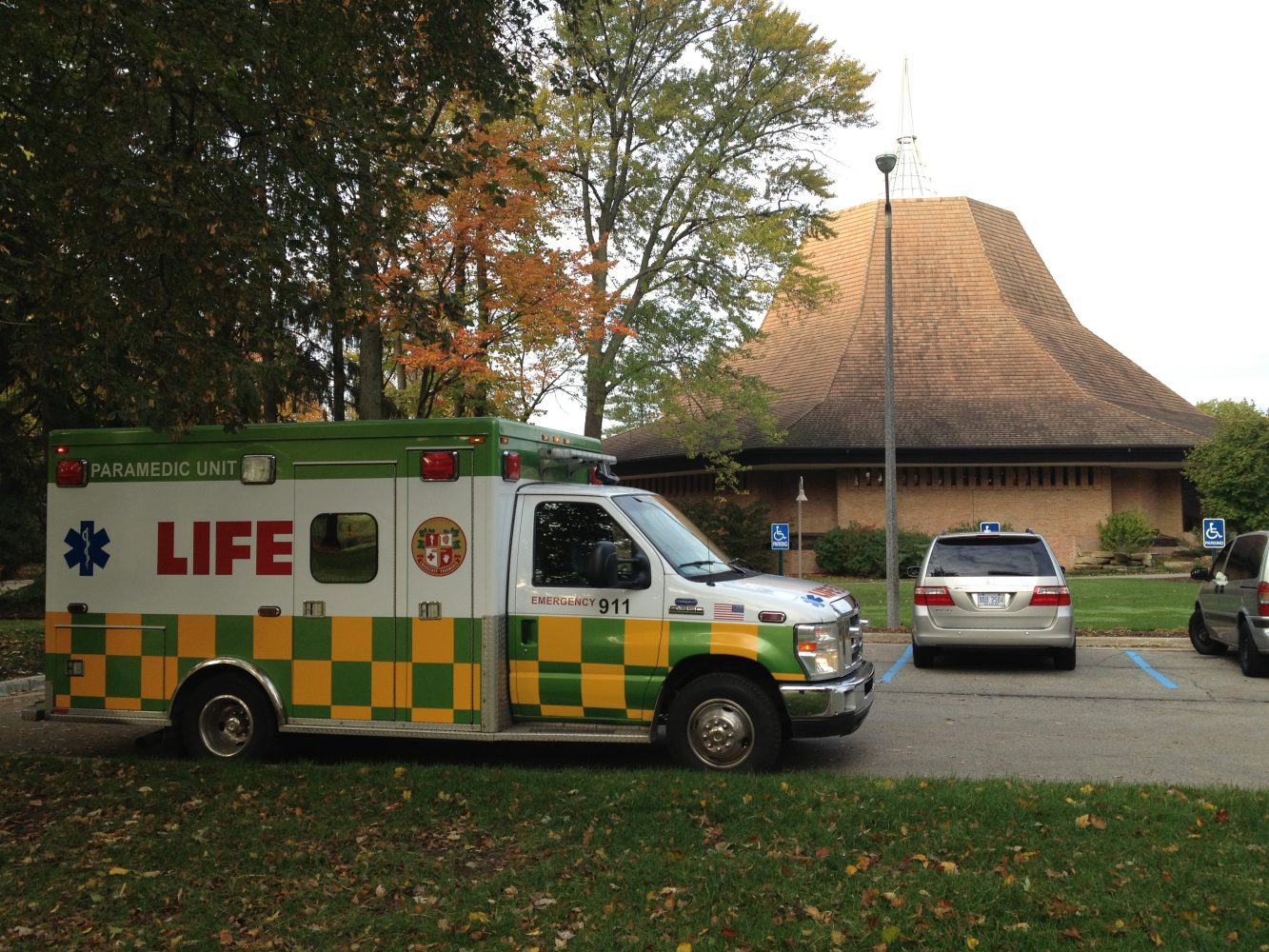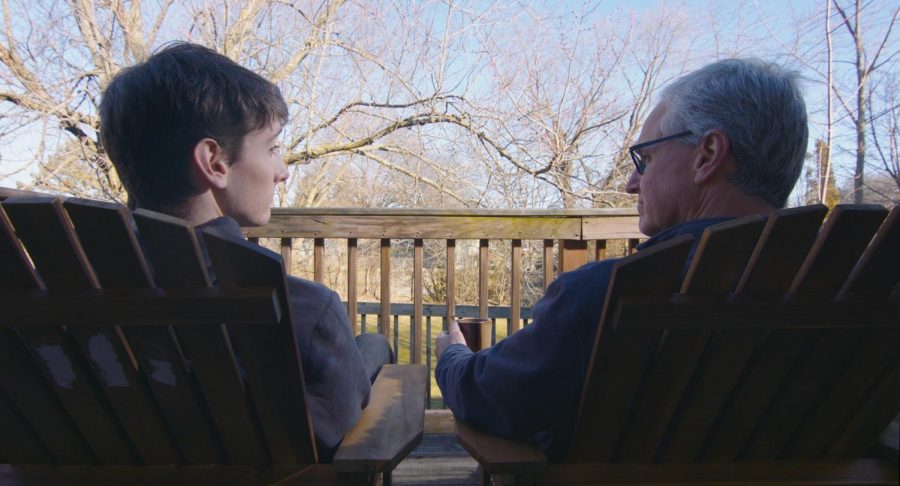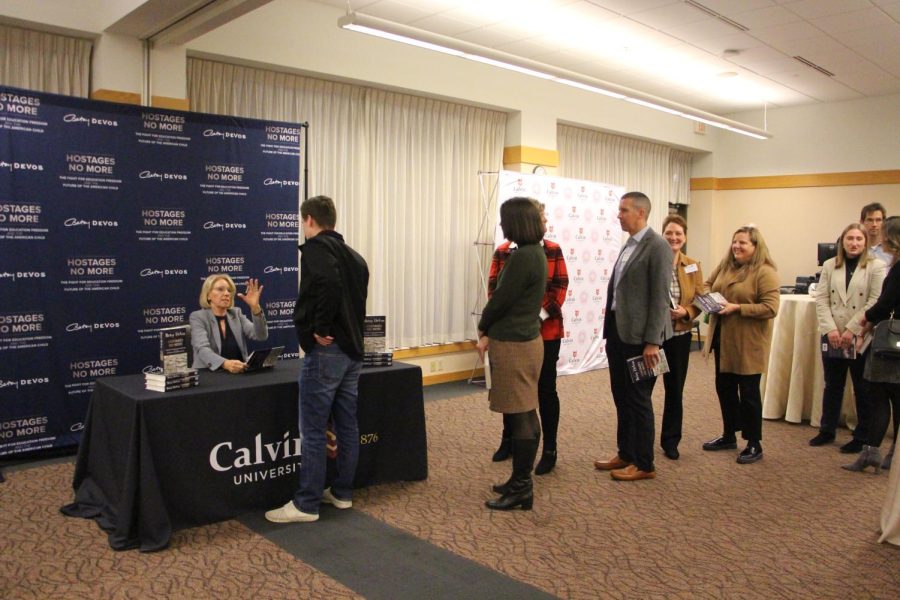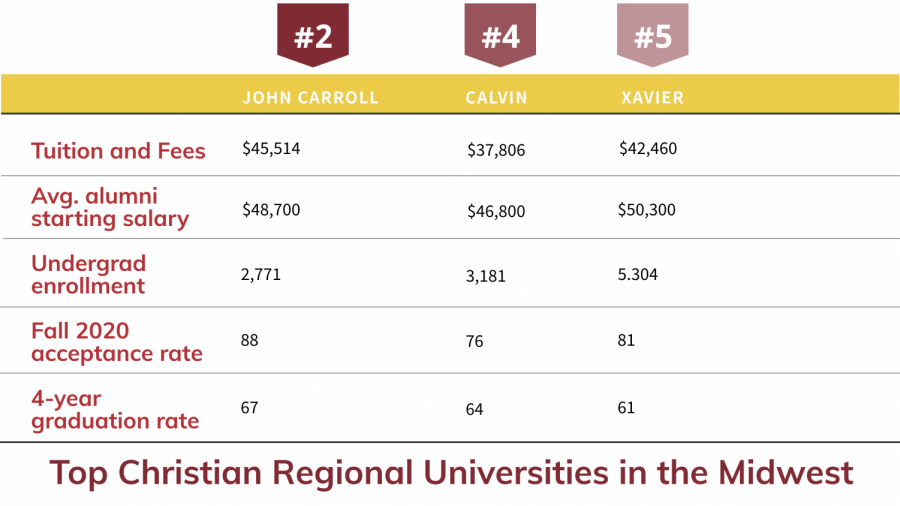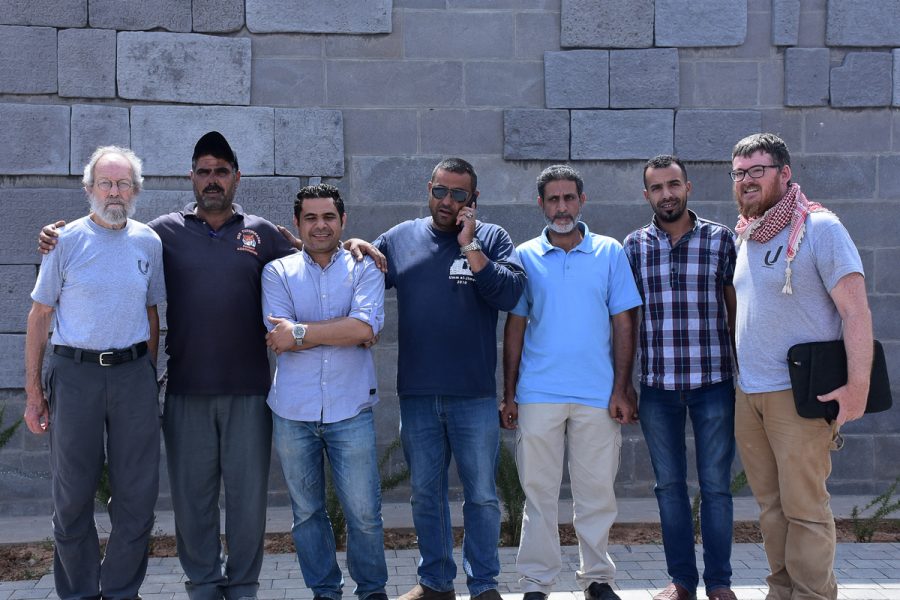When junior Doug Faber and senior Todd Jacobs filed into their business class Thursday morning, both expected another routine day of attending classes.
The two had never said a word to each other before professor Bob Medema’s lecture on mutually exclusive investments began.
But less than half an hour later, Jacobs and his classmates were in a race to save Faber’s life.
About 20 minutes into the lecture, Medema noticed that something had gone horribly wrong for Faber, who was sitting in the front row.
“Doug leaned back in his chair and his eyes rolled back,” explained Medema. “I asked students on either side of him and a student behind him to protect him, watch his tongue and help him work through it.”
But after thirty seconds of watching Faber, Jacobs knew something wasn’t right.
“He was gasping for air, and that kind of concerned me,” said Jacobs, who originally thought Faber was having a seizure. “He started losing his color, and that changed the dynamic of what a normal seizure looked like. It just didn’t feel right.”
Students cleared the tables and got Faber onto the floor while another classmate called campus safety. Other students began praying for their classmate.
Meanwhile, Jacobs went into the hallway to find an automated external defibrillator (AED), a machine that delivers an electrical shock to stabilize an irregular heartbeat.
His search didn’t last long: the only AED in the hall was right outside the classroom.
“You hope you’re not going to have to use it,” said Jacobs, “but we made sure everyone was clear and shocked him.”
Two minutes after the initial call for help, campus safety officers arrived and took over with CPR.
They administered the AED a second time.
The fire department arrived shortly after and continued CPR. They shocked Faber a third time.
It was after the third shock that first responders were able to stabilize Faber’s heartbeat and take him to the hospital downtown.
After effects
At the hospital, doctors found that Faber suffers from Wolff-Parkinson-White syndrome, a disease where extra electrical pathways can cause chambers in the heart to contract earlier than they are supposed to.
“Doug had a condition that he didn’t know about, nobody did,” Medema explained to his class Tuesday. “It was going to manifest itself at some point in time at some place. It happened here. I don’t think that was coincidental. I think it was providential.”
Doctors performed an operation to get rid of the extra pathways and installed an internal cardiac defibrillator that will automatically shock Faber if it happens again.
“It will feel like I’m getting kicked in the chest by a horse, so hopefully it won’t happen,” said Faber. “Hopefully it’s just there for safety.”
Faber was released from the hospital on Sunday, and he returned to the same business class on Tuesday morning.
Doug’s parents, Paul and Jamie, came back to the class with Faber to thank the class for their action.
“Whether you were the camp counselor who was using the AED, whether you were the person helping him down until campus safety came or whether you were the person praying, we are so grateful for every single one of you,” said Jamie.
Aaron Winkle, associate chaplain for upperclass students, also thanked the students.
“We often talk about being a community,” Winkle began. “I think Calvin College is a great college every day, but in crisis, Calvin College is an extraordinary place.”
“We feel so blessed that Doug was led here and had such wonderful people support us in every way possible,” said Jamie.
How training saved a life
Doctors say the end result could have been much different if not for the quick response of the classmates and their professor.
“The doctors informed Doug’s family that had we not taken the action we did in the classroom that he would not have survived,” said Medema.
Bill Corner, the director of campus safety, agreed.
“The students and the professor did an excellent job,” he said. “They helped keep him going until we could get there. It cannot be overemphasized what a great job they did.”
Jacobs had been trained to use an AED as a camp counselor, but Thursday morning was the first time his CPR and AED training had been put to the test.
“When you’re the person who started the whole process, you’re hoping that you didn’t do something that could have harmed him,” he said. “You could still hear moaning, especially while he was being shocked and trying to fight to stay alive.”
Jacobs said that he doesn’t know what compelled him to get up and to think to use the AED.
“Most people say ‘why did you think to use the AED right away?’ and I don’t know,” he said. “I really don’t even remember getting out of my chair and getting behind him.”
Like Jacobs, Medema also said that he was completely focused on helping Faber.
“The only thing on my mind was that we needed to save this kid,” he said. “You go into crisis mode and you’re oblivious to everything else going on. I was just trying to assess the situation and make the right decisions.”
Shirley Hoogstra, vice president for student life, sent out an email early Thursday afternoon to students, faculty and staff releasing Faber’s name and some details of the emergency.
“What’s so impressive about emergency response, whether it’s the students in the room or campus safety, is that you have a ton of responsibility and very little information. It takes real courage,” said Hoogstra.
“The system worked perfectly…”
But the response from students in the classroom was coupled with a quick response from campus safety and Grand Rapids emergency teams.
Campus safety was on the scene within two minutes of the initial call.
“My staff did a great job. We handle everything from a cut finger to cardiac arrest and in between,” Corner said. “It’s important for us to be able to handle those situations well. My staff did a great job, as did everybody else.”
The fire department was there within nine minutes and an ambulance was on the scene in fifteen minutes.
“The system worked perfectly on Thursday,” said Corner. “If you’re going to have a medical emergency, that’s how you want everything to work in terms of a response.”
Corner also highlighted the importance of having an AED nearby. He explained that every academic building has one and all campus safety vehicles are also equipped with AEDs.
“But the AED doesn’t have legs,” said Corner. “The only way the AED was going to do something was if someone went and got it. You have to have people who know how to do them and aren’t afraid to use them.”
Medema also highlighted other parts of the Calvin community that responded.
“The whole college, the whole community stepped up. The chaplain’s office, student life, campus nurses, campus safety — college-wide, everyone responded admirably. The whole college community was there to support,” he said.
Hoogstra commended everyone involved for taking action in the crisis.
“In this situation, the students, the professor, campus safety and the ambulance … every piece of that was integral to the outcome,” she said.
Seeing God at work
Jacobs reflected on how God used his camp counselor experience to lead up to his action in the classroom.
“It couldn’t have been in a better situation,” Jacobs said. “If it had happened earlier that morning while he was at home or when people weren’t around, it could have been much different. It’s amazing how God has things planned out and sometimes it takes event like this to step back and realize that plan.”
Medema also reflected on how he saw God present through the morning’s events.
“It happened at a time and at a place where he was with brothers and sisters who were able and willing to help him and where there was a defibrillator in the hallway right outside the classroom,” said Medema. “The fact it happened where it did and when it did I think was God’s providence. That was just amazing.”
Looking ahead
Since the incident, Faber has been suffering from short-term memory loss because of oxygen deprivation during the ordeal.
On Thursday afternoon, his short-term memory would reset every 15 seconds, and he would continue to ask where he was and what happened.
“My good and faithful friends would answer me the same every single time,” Faber said.
“He could only remember maybe 30 seconds to a minute of what we were telling him,” explained Wesley Richards, Faber’s roommate of three years. “It was like resetting a computer.”
Faber’s short-term memory continues to improve, and doctors say that the problem should completely fade in coming weeks.
Although he has a short recovery yet to come, Faber knows that his situation could have been much worse.
“I’m certainly happy to be alive, happy that God decided to keep me around a little longer,” said Faber. “I would say to my class, especially Todd, and to everybody who prayed for me ― they saved my life. I’m of course, eternally grateful. I’m very thankful for my friends, who spent a lot of time at the hospital this weekend instead of having fun.”
And while Faber doesn’t remember anything from Thursday morning’s class, there is one thing he’s resolved to do.
“I’m going to learn how to use an AED,” he said.




